Make astronomy vocabulary exciting with these fun approaches: Cosmic Vocabulary Bingo, Celestial Flashcard Challenges, Word Searches, Star-Themed Crosswords, Space Vocabulary Scavenger Hunts, Planetary Charades, and hands-on solar system models. These activities transform complex terms like “supernova” and “black hole” into engaging games that boost retention while sparking curiosity. You’ll discover how acting out an orbit or creating mnemonic devices can turn cosmic terminology into an adventure worth exploring.
7 Fun Ways to Learn Astronomy Words
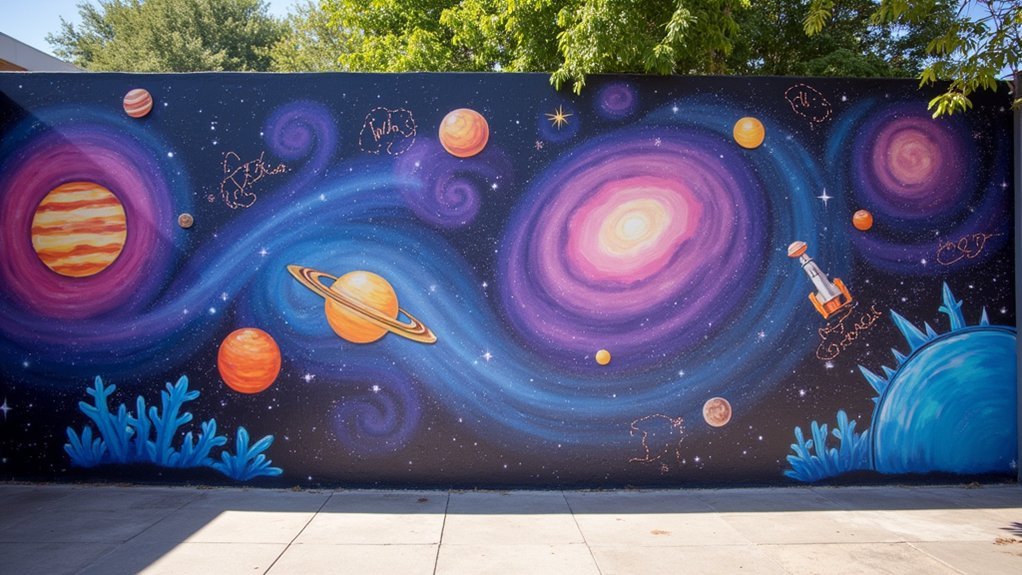
Five engaging approaches can transform astronomy vocabulary from intimidating to fascinating. Interactive games from platforms like ABCya boost cognitive development while making astronomy terms enjoyable.
Creating flashcards with words like “orbit” and “telescope” enhances memory retention through visual learning.
Hands-on projects, such as building model solar systems, help you connect terminology with their real-world counterparts. When tackling complex concepts, try mnemonic devices—associate “light year” with the distance light travels in a year to cement its meaning.
Organize a vocabulary scavenger hunt where you search for astronomy terms throughout your classroom, promoting active learning and teamwork.
These methods turn abstract cosmic concepts into accessible knowledge, making the universe’s vocabulary part of your own.
Cosmic Vocabulary Bingo: Turn Star Terms Into a Game
Transforming abstract space terminology into an exciting classroom competition, Cosmic Vocabulary Bingo offers an irresistible way to master astronomical terms.
You’ll receive a unique bingo card filled with celestial terms like “supernova,” “black hole,” and “orbit,” making learning fun while building your cosmic vocabulary.
As your teacher calls out definitions, you’ll mark matching astronomy terms on your card, reinforcing your understanding of complex concepts. This game promotes vocabulary retention through active engagement rather than rote memorization.
It’s not just educational—it fosters teamwork and communication as you discuss and help classmates identify terms.
The beauty of Cosmic Vocabulary Bingo lies in its adaptability across different skill levels. Teachers can adjust term complexity to suit beginner stargazers or advanced astronomy enthusiasts alike.
Celestial Flashcard Challenge: Visualize the Universe
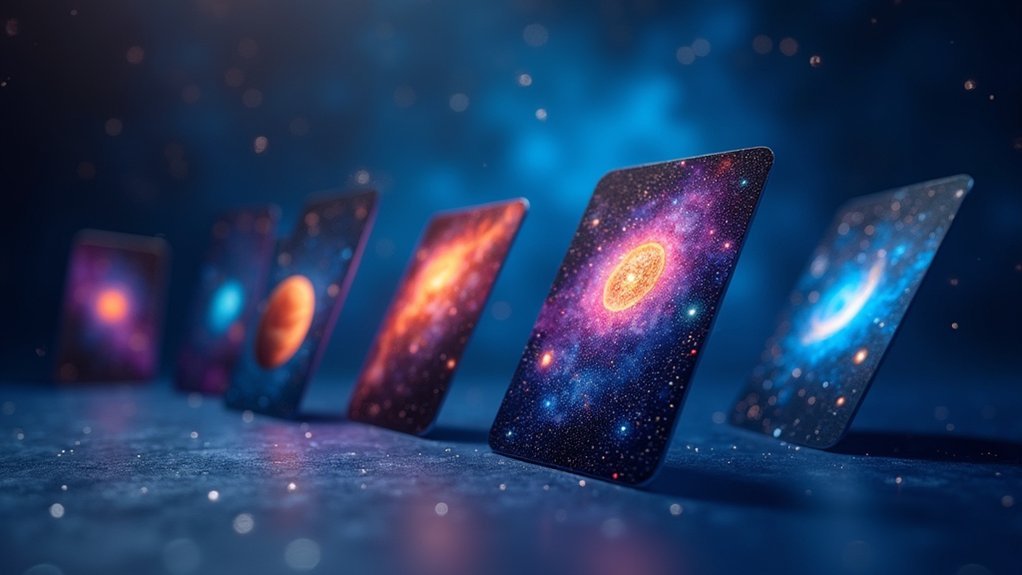
While books and lectures provide valuable astronomy knowledge, nothing quite compares to the vibrant world of celestial flashcards for making cosmic concepts stick. These colorful visual aids boost vocabulary retention through interactive learning that engages multiple senses.
| Flashcard Type | Learning Benefit |
|---|---|
| Image-based | Visual recognition |
| Fun facts | Contextual memory |
| Definition cards | Terminology mastery |
| Match challenges | Application skills |
| Self-created | Creative reinforcement |
Create your own flashcards featuring amazing cosmic imagery and fun facts like Venus being Earth’s twin in size or a light-year spanning 5.88 trillion miles. Try timed challenges where you match terms like “supermassive” with their definitions. This approach transforms astronomy vocabulary from intimidating jargon to familiar concepts, making your journey through the cosmos more engaging and memorable.
Astronomy Word Searches: Hunt for Hidden Stellar Terms
You’ll build essential astronomy vocabulary as you search for terms like “supernova” and “orbit” in word puzzles that range from beginner to advanced levels.
These engaging hunts can be tailored to match different grade levels, making them perfect for PreK through 6th-grade students exploring the cosmos.
Your word search adventures create natural opportunities for cross-curricular learning by connecting astronomy concepts with language skills and pattern recognition.
Word Searches Develop Vocabulary
The humble word search transforms into a celestial adventure when filled with astronomy terms. As you scan for words like “supernova” and “telescope,” you’re actually building critical vocabulary while enjoying the challenge.
Students of all ages find these engaging puzzles an effective way to internalize celestial terminology without the pressure of formal study.
You’ll notice improved retention as learners connect with astronomy concepts through active discovery. Word searches work exceptionally well for PreK through 6th grade students, who benefit from the visual reinforcement of important terms.
Try implementing collaborative learning by having students work in pairs—they’ll discuss terminology while hunting for hidden words together. This combination of fun and learning creates the perfect environment for astronomy vocabulary to take root in young minds.
Beginner to Advanced Puzzles
Astronomy word searches come in a wide range of difficulty levels, making them perfect for learners at any stage of their cosmic journey.
You’ll find beginner-friendly puzzles featuring simple terms like “planet” and “star,” ideal for those just starting to explore the universe. As your knowledge expands, try intermediate word searches focused on specific areas like our solar system or celestial bodies.
For advanced learners, challenging puzzles incorporate complex vocabulary such as “supermassive” and “light year,” pushing your astronomical knowledge further.
These interactive educational resources can be easily incorporated into lesson plans, reinforcing terminology through visual and hands-on engagement. The best part? You can find astronomy word searches online to match any learning objective, making vocabulary acquisition both effective and enjoyable as you hunt for hidden stellar terms.
Cross-Curricular Learning Opportunities
Connecting far beyond the stars, astronomy word searches offer rich cross-curricular learning opportunities that blend multiple subjects into one engaging activity.
When you incorporate these puzzles, you’re simultaneously strengthening vocabulary retention and spelling skills while exploring physics, math, and history through carefully selected astronomy terms.
You can tailor word searches to appropriate grade levels, making celestial phenomena accessible to students from PreK through 6th grade.
Try pairing these activities with hands-on activities like night sky observations or planetary model building to deepen understanding.
For maximum impact, encourage collaborative learning by having students work in pairs to complete the puzzles.
This approach fosters teamwork and communication as they hunt for terms like “orbit,” “telescope,” and “supermassive”—creating meaningful connections between astronomy and other academic disciplines.
Star-Themed Crossword Puzzles: Connect Cosmic Concepts
Five minutes with a star-themed crossword puzzle can transform astronomy vocabulary from intimidating jargon into familiar friends. As you work through clues about celestial bodies and cosmic phenomena, you’ll strengthen your understanding of key concepts while having fun.
These puzzles integrate terms like “orbit,” “supernova,” and “telescope,” challenging you to connect clues with astronomical knowledge. When puzzles reference real-world events such as eclipses or planetary alignments, you’ll find the content more engaging and relevant.
Teachers can use these crosswords as an assessment tool to measure your comprehension, while you’ll benefit from vocabulary improvement and enhanced critical thinking skills.
Space Vocabulary Scavenger Hunt: Find Objects That Match Terms

| Term | Object to Find | Represents |
|---|---|---|
| Orbit | Circular item | Planetary path |
| Telescope | Magnifying glass | Observation tool |
| Supermassive | Heavy book | Black hole density |
| Constellation | Connect-the-dots | Star patterns |
| Galaxy | Spiral drawing | Cosmic structure |
Incorporate digital exploration by using space apps to match terms with images. After your hunt, gather for a group discussion to share discoveries and deepen understanding. Complete printable worksheets where you can draw or paste pictures of found items, connecting them to astronomical vocabulary in a creative way.
Planetary Charades: Act Out Astronomical Phenomena
Transform your living room into a cosmic theater with Planetary Charades, where players bring the universe to life through movement and expression.
Take turns acting out astronomical phenomena while others guess—orbit around a friend to demonstrate planetary motion or dramatically collapse to portray a black hole’s formation.
Challenge each other with specific vocabulary words like “eclipse,” “comet,” or “supernova” to expand your astronomy lexicon.
Make the game more interactive by incorporating props: use a flashlight as a star or a ball as a planet. Track correct guesses to reinforce learning and celebrate progress.
Set a time limit for each charade to keep energy high and encourage quick thinking.
You’ll soon find yourself mastering complex space concepts while having a blast!
Frequently Asked Questions
What Are Some Quirky Space Words?
You’ll find fascinating space terms like “supernova,” “zodiac,” “wormhole,” “zenith,” and “light year.” Each captures something unique about our universe, from explosive star deaths to hypothetical spacetime tunnels for interstellar travel.
What Is the Easiest Way to Learn Astronomy?
You’ll learn astronomy easiest by starting with naked-eye observations. Download stargazing apps, watch documentaries, join local astronomy clubs, and practice regularly. Hands-on experiences with telescopes will make complex concepts stick naturally.
What Are Words for Astronomy Lovers?
You’ll want to explore words like “planet,” “star,” “orbital,” “light year,” “telescope,” “observatory,” “supernova,” “black hole,” “quasar,” and “exoplanet” to enhance your astronomy vocabulary and discussions about the cosmos.
What Is the Scientific Word for Space?
The scientific word for space is “cosmos.” When you’re discussing the universe beyond Earth, you’ll often hear astronomers use this term to describe the vast, orderly system of celestial bodies and phenomena.
In Summary
Now you’re ready to explore the universe with your expanded astronomical vocabulary! Whether you’re playing cosmic bingo, solving star-themed puzzles, or acting out planetary movements, you’ve made learning fun. Don’t stop here—keep building your knowledge by combining these games with actual stargazing. You’ll soon be speaking like an astronomer and seeing the night sky in an entirely new light.

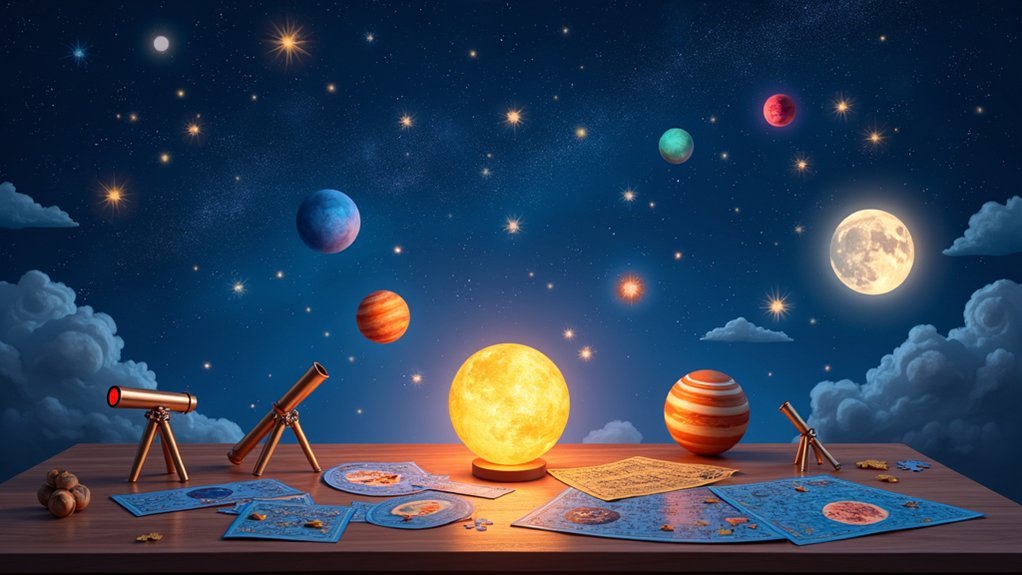

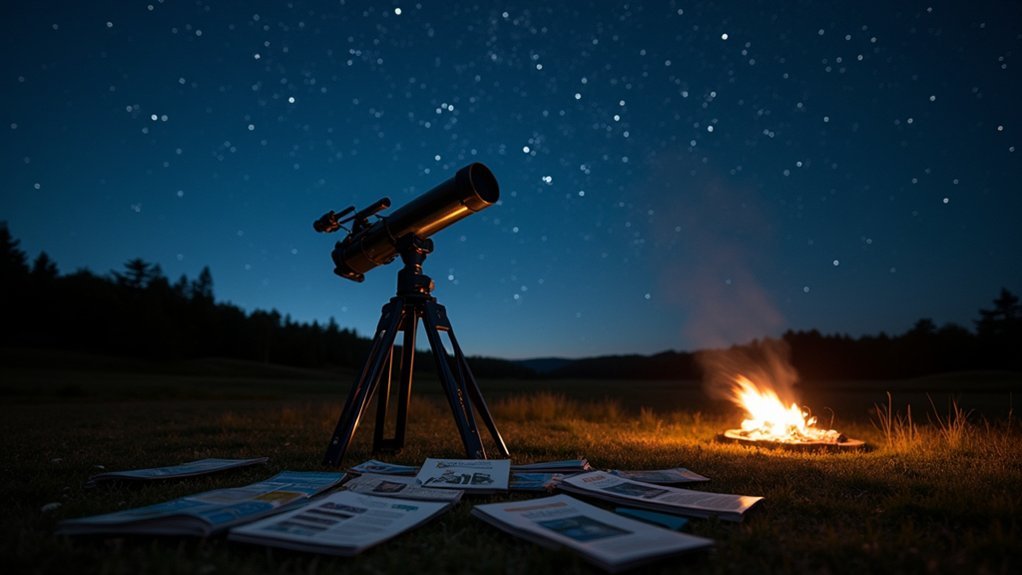
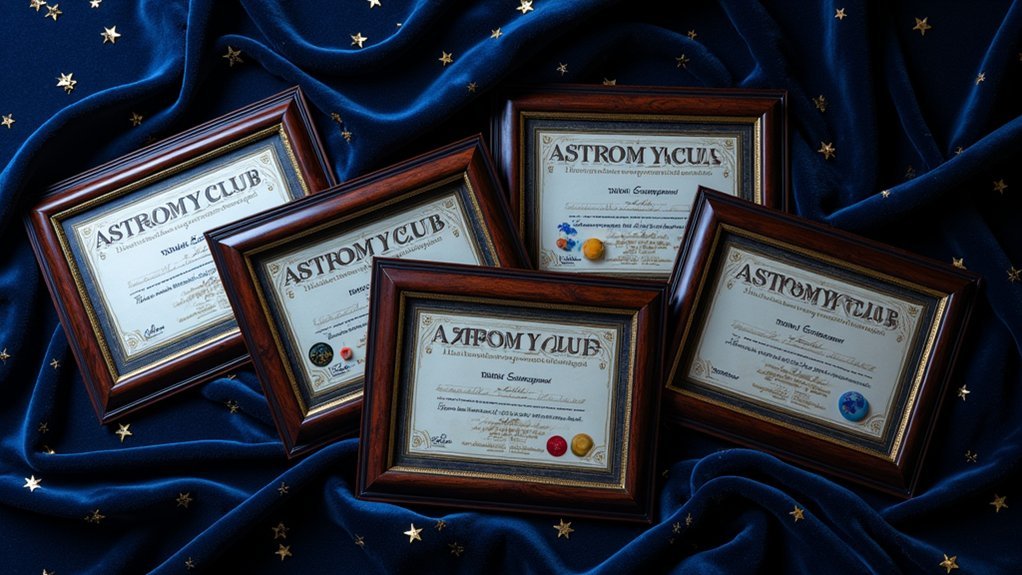
Leave a Reply